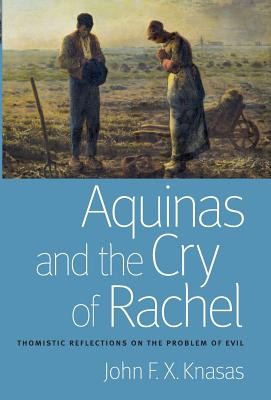
- We will send in 10–14 business days.
- Author: John F X Knasas
- Publisher: Catholic University of America Press
- ISBN-10: 0813221765
- ISBN-13: 9780813221762
- Format: 14.5 x 22.5 x 2.6 cm, hardcover
- Language: English
- SAVE -10% with code: EXTRA
Aquinas and the Cry of Rachel Thomistic Reflections on the Problem of Evil (e-book) (used book) | bookbook.eu
Reviews
Description
In Aquinas and the Cry of Rachel, John F. X. Knasas explores Thomas Aquinas'' philosophical thinking about evil, and brings the results into discussion with the contemporary theodicies - philosophies of the problem of evil. It examines the relation of the human person and human nature to nature as a whole. Generally speaking, possible philosophical accounts for evil are two kinds: cosmological or personal. The cosmological account has evils rebounding to the perfection of creation. The personal account would have evils suffered rebounding to the good of the sufferer. Knasas argues that for Aquinas no philosophical resolution of these two kinds of accounts is possible. This argument is based upon Aquinas'' understanding of the human as an intellector of analogical being. Such an understanding establishes two truths. First, the human is by nature only a principal part of the created whole. Second, there is the philosophically discernible possibility of supernatural elevation by the creator. Hence, as far as philosophy can discern, evil may have a natural explanation or it may have a supernatural one. The Thomistic philosopher has no answer as to why evil exists because that philosopher discerns too many possible ones. In that respect, Aquinas'' thinking on evil is similar to his thinking about the philosophical knowledge of the biblical truth of the world's creation in time. Such a creation is one metaphysical possibility among others.
EXTRA 10 % discount with code: EXTRA
The promotion ends in 20d.14:32:38
The discount code is valid when purchasing from 10 €. Discounts do not stack.
- Author: John F X Knasas
- Publisher: Catholic University of America Press
- ISBN-10: 0813221765
- ISBN-13: 9780813221762
- Format: 14.5 x 22.5 x 2.6 cm, hardcover
- Language: English English
In Aquinas and the Cry of Rachel, John F. X. Knasas explores Thomas Aquinas'' philosophical thinking about evil, and brings the results into discussion with the contemporary theodicies - philosophies of the problem of evil. It examines the relation of the human person and human nature to nature as a whole. Generally speaking, possible philosophical accounts for evil are two kinds: cosmological or personal. The cosmological account has evils rebounding to the perfection of creation. The personal account would have evils suffered rebounding to the good of the sufferer. Knasas argues that for Aquinas no philosophical resolution of these two kinds of accounts is possible. This argument is based upon Aquinas'' understanding of the human as an intellector of analogical being. Such an understanding establishes two truths. First, the human is by nature only a principal part of the created whole. Second, there is the philosophically discernible possibility of supernatural elevation by the creator. Hence, as far as philosophy can discern, evil may have a natural explanation or it may have a supernatural one. The Thomistic philosopher has no answer as to why evil exists because that philosopher discerns too many possible ones. In that respect, Aquinas'' thinking on evil is similar to his thinking about the philosophical knowledge of the biblical truth of the world's creation in time. Such a creation is one metaphysical possibility among others.


Reviews